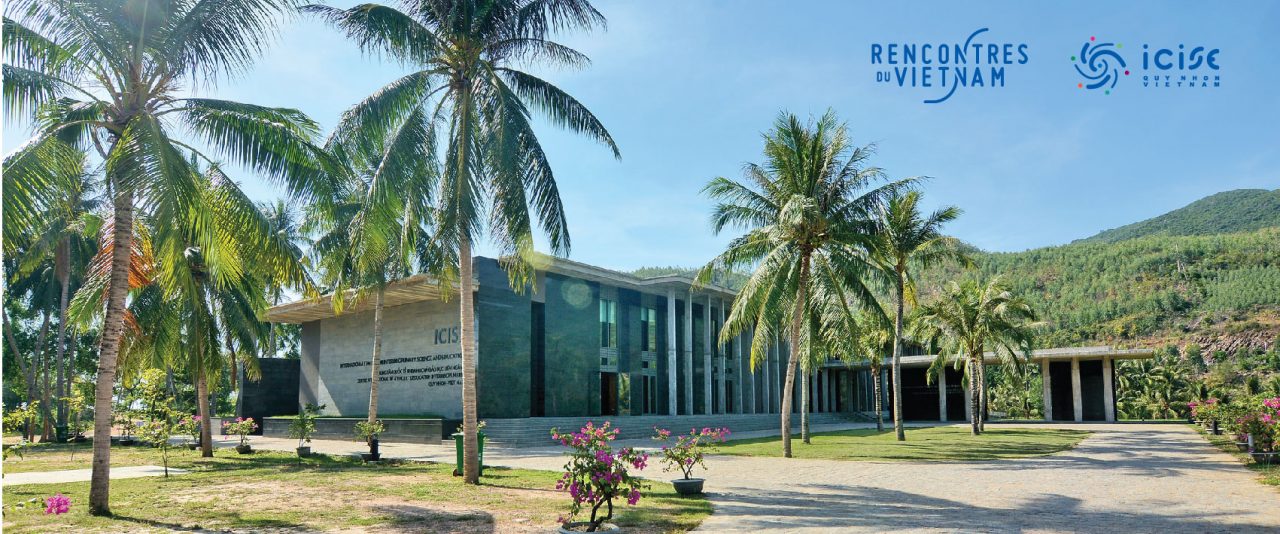
Starts: 15 April, 2024
Ends: 15 April, 2024
Address:
07 Đại lộ Khoa học, Ghềnh Ráng, Quy Nhơn, Bình Định.
Summary:
Vietnam School of Earth Observation
Rencontres du Vietnam – University of Science and Technology of Hanoi
Remote Sensing for Earth Observation will become a scientific priority in Vietnam for the next decades. In this perspective and in conclusion of a workshop organized by the « Space and Aeronautics » department (S&A) of USTH (University of Science and Technology of Hanoi) on March 15 to 17, 2017, « Rencontres du Vietnam » and USTH decided to organize an annual Summer school dedicated to Remote Sensing for Earth Observation. A large amount of free of charge data related to observations of Vietnam from space will be available and can be used by Vietnamese institutions. Some initiatives to facilitate access to « Analysis ready set of data » for the Vietnamese community, like the CEOS DataCube center at VAST/VNSC, have already been taken and will be pursued in the next coming years.
To contribute to the training of the Vietnamese scientific community, the Vietnam School of Earth Observation (VSEO) will be held every year at the ICISE center at Quy Nhon in the framework of the Rencontres du Vietnam with the decisive contributions of French institutions and expertise (including CNES, CNRS, Paris Observatory and Paris Diderot, Paris-Est Créteil and Montpellier universities) and the University of Science and Technology of Hanoi (USTH).
Chairpersons :
Jean Tran Thanh Van (Rencontres du Vietnam – ICISE)
Patrick Boiron (USTH)
Yannick Giraud-Héraud (USTH/SA – Rencontres du Vietnam)
Scientific Advisory Committee :
Marine Herrmann (USTH/WEO, Hanoi)
Stéphane Jacquemoud (UPD/IPGP, Paris)
Lam Dao Nguyen (VNSC, Ho Chi Minh City)
Thuy Le Toan (CESBIO,Toulouse)
Ngo Duc Thanh (USTH, Hanoi)
Catherine Prigent (LERMA/Observatoire de Paris, Paris)
Linda Tomasini (CNES, Toulouse)
Ha Tran (LMD/UPMC, Paris)
14th Rencontres du Vietnam
Atmospheric Remote Sensing and Molecular Spectroscopy
August 26-31, 2018
Quy Nhon, Vietnam
Climate change and air quality are among the most serious problems presently facing mankind. Primary pollutants like nitrogen oxides, volatile organics, and fine particles as well as secondary pollutants formed subsequently in the gas phase, such as ozone, are a major problem for public health especially in urban areas. It is also well established that the chemical composition of the atmosphere is a main factor which affects the Earth’s climate and that climate change is mainly due to the presence of greenhouse gases (GHG) whose mixing ratios significantly increased since preindustrial time. Various instruments, including spectrometers and LIDAR, on-board satellites, balloons, aircrafts and in ground-based observatories are used for remote sensing of atmospheric trace gases and aerosols and to determine spatial and seasonal variations of atmospheric species in order to understand the causes and consequences of global warming. They measure the solar radiation transmitted through the atmosphere, radiation emitted by the ground, and radiation emitted by the atmosphere itself. Inversion methods are used to analyse atmospheric spectra. They use accurate spectroscopic parameters from laboratory experiments and theory as well as radiative transfer codes.
Applications such as gas/aerosols retrievals with satellites, studies of urban pollution, greenhouse gas detection and climate change rely on precise and accurate atmospheric measurements. The most advanced spectroscopic remote sensing techniques are needed to meet the requirements of 3D atmospheric chemistry-transport models used for prediction of air quality and GHG concentrations.
This summer school will discuss recent advances in atmospheric remote sensing made possible through accurate measurement, understanding and interpretation of molecular spectra. An introduction to molecular spectroscopy will be given. The aim of this school is to provide to all participants a multidisciplinary training (lectures, tutorials, conferences) of this important sub-discipline of the atmospheric sciences.
Lectures are delivered in English by French experts in the field. Participants will be able to present their own research (oral or poster). The school is addressed to all Vietnamese researchers interested in atmospheric remote sensing, air quality and climate change studies (young, confirmed, PhD and Master level). There will be opportunities for establishing research collaborations between participants and lecturers, sharing ideas and discussions on new research topics in Vietnam.
contact for the scientific program : Ha Tran <ha.tran@lmd.jussieu.fr> (LMD/IPSL CNRS, Sorbonne Universités, Paris, France)
Scientific and Local Organizing Committee:
Ha Tran – Chair (LMD/IPSL CNRS, Sorbonne Universités, Paris, France)
Yannick Giraud-Héraud (APC – CNRS/Université Paris Diderot & Space & Aeronautics department – University of Science and Technology of Hanoï, Hanoi, Vietnam)
Ngo Duc Thanh (Space & Aeronautics department – University of Science and Technology of Hanoï, Hanoi, Vietnam)
Ngo Ngoc Hoa (Faculty of Physics, Hanoi National University of Education, Hanoi, Vietnam)
Martin Schwell (LISA/IPSL, CNRS, Université Paris-Est Créteil, Créteil, France)
Linda Tomasini (Centre National d’Etudes Spatiales, Toulouse, France)
Jean Tran Thanh Van (ICISE, Vietnam)
For more information:
http://rencontresduvietnam.org/conferences/2018/VSEO_atmospheric_remote_sensing/